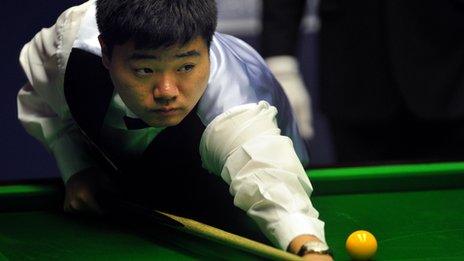Indian Open: Can snooker conquer India as it has China?
- Published
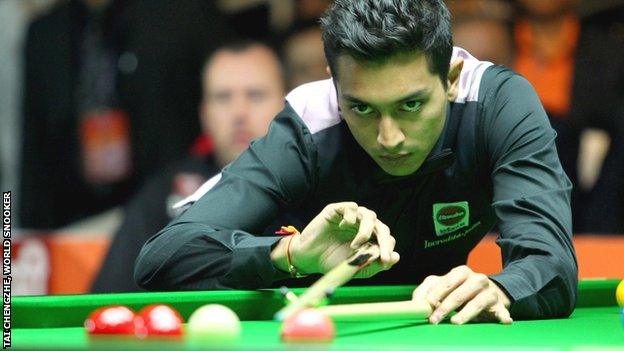
India's number one player Aditya Mehta is now ranked 49 in the world
As MS Dhoni's powerful India team were bowling out Ireland on their way to a fifth straight win at the Cricket World Cup in New Zealand on Tuesday, snooker's Indian Open tournament got under way in Mumbai.
Mumbai doesn't really do 'at a standstill' even when cricketing heroes are on television. But the city's eyeballs were largely trained elsewhere as the curtain went up on the second ranking event staged in the country where snooker was invented 140 years ago in a British Army officers' mess.
The number of rickshaws arriving at the Grand Hyatt hotel, the tournament venue, was slow for the early-morning session. But as India breezily knocked off the runs for an eight-wicket victory in Hamilton, the enthusiastic and the curious started to drift in for the snooker.
This is one of the sport's new frontiers, a country already boasting millions of players and one which governing body World Snooker hopes will play an integral part in snooker's ambition to "become a truly global sport".
With a strong history of cue-sports, an established ranking tournament and the emergence of Aditya Mehta as a ranking-event finalist, could India - with a population of 1.25 billion - live up to its billing as 'the new China' and become a real hot-bed for snooker?
The birthplace of the game
India will always have its place in snooker history. The game, with its six coloured balls in addition to the 15 reds and white cue ball, is widely acknowledged to have been invented in 1875 in the city of Jabalpur, around 450 miles to the south-east of the capital Delhi.
According to author and essayist Compton MacKenzie,, external young British Army lieutenant Neville Chamberlain - not the former British Prime Minister - was casually experimenting with the game of 'Black Pool' using 15 reds and a black.
Having thrown on some extra coloured balls and recalling that rookie cadets at the Royal Military Academy at Woolwich were called 'snookers', Chamberlain observed that all those present were snookers at this version. The name stuck. Chamberlain's Devonshire regiment, now known as the Rifles, remain fiercely proud of their role in snooker's conception.
In the 1880s, Chamberlain was based in the hill station of Ootacamund - or 'Snooty Ooty' as the exclusive mountain retreat was known - in the state of Tamil Nadu in south-east India. The young officer even named his horse 'Snooker' and the game was further nurtured in the colonial-style Ooty Club, a big part of the sport's folklore.
'Still perceived as an elitist sport in India'
Perhaps as a hangover from its colonial origins, snooker was for a long time seen as an elitist and inaccessible game in India.
But the arrival of the exotically named 'snooker parlours' in big cities, combined with tables in social clubs, have helped transform the landscape. A recent survey by the Billiards and Snooker Federation of India (BSFI) suggested there are currently 2.5m players - with that figure set to rise dramatically.
Plans for a new national league and hundreds of tournaments were unveiled here at the Indian Open, with a series of televised, hour-long combined cue-sports events featuring snooker, pool and billiards.
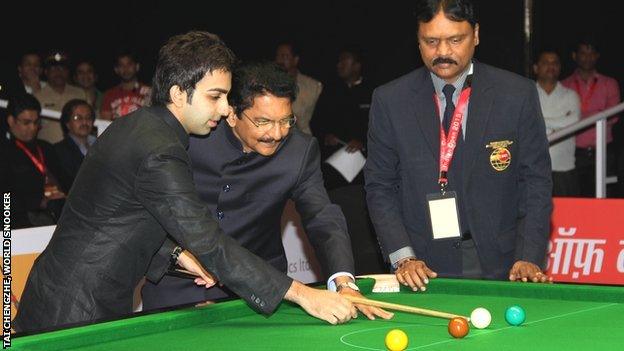
Advani (left) gives some tips to the Honourable Governor of Maharashtra, Vidyasagar Rao ji, as captain PVK Mohan (right), president of the BSFI, looks on
Pankaj Advani, a multiple billiards world champion, has flirted with snooker in recent years, describing his agonised relationship between the two as "like having a wife and a mistress".
The 29-year-old became the first Indian to reach the quarter-finals of a world ranking snooker event at the Welsh Open in 2013, only to return to his 'wife' - billiards - last year. His popularity still secured him one of six wildcard spots reserved for local amateurs at this Indian Open, despite no longer being on tour. But his participation ended on Tuesday with a 4-3 loss to Scotsman Rhys Clark.
"Putting on the Indian Open is a great thing - but it needs to be followed up, and it will be," Advani says. "Right now we are at a crucial stage where it could really be opened out.
"Snooker has been, and still is to a lesser degree, perceived as an elitist sport in India; that's something that is different to the UK. The game is played mainly in the really big cities and it needs to get out to the smaller cities."
Srinivasan Balasubramaniam is secretary general of the BSFI, and one of the prime movers in spreading the gospel. "The big difference between India and China with snooker is the position and importance of billiards," he said.
"The trend is towards snooker though; it has grown tremendously and a lot of youngsters are taking to it. They seem to find snooker a more exciting game, have seen it on TV and follow it closely."
Home hope Mehta under 'acute' pressure
As India's only current tour professional and most successful snooker player after his ground-breaking run to the 2013 Indian Open final, Mehta has a considerable burden of pressure and expectation to shoulder. At times that appears to weigh heavily on him.
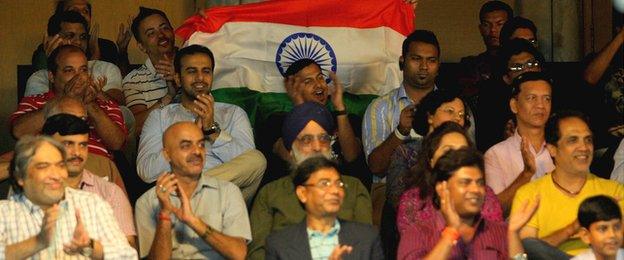
Partisan crowds flock to see home favourites Aditya Mehta and Pankaj Advani in action
As India's only current tour professional and most successful snooker player after his ground-breaking run to the 2013 Indian Open final, Mehta has a considerable burden of pressure and expectation to shoulder. At times that load looks to weigh heavily on the 29-year-old.
A quieter character than showman Advani, Mehta felt huge relief at winning his qualifier to be certain of appearing in his home city of Mumbai. "I knew the importance of qualifying for this one, the extra pressure to have India's only snooker professional at the event," he said. "If anything it is more acute since Pankaj switched back to billiards."
Up to number 49 in the world rankings, Mehta is a fine ambassador for his sport and country but has struggled, as did Advani and other players such as China's Ding Junhui and Australian Neil Robertson before him, with uprooting himself from family to be based in the UK.
Now based in north London, he wants that path eased for those following behind him. "I want people to see it is possible and help our youngsters. I had to move homes about seven times in eight years in the UK and there is a big financial cost.
"India needs to do more than just hold one ranking event; it needs to support both the grassroots and its future professionals. We have to look after the professionals on tour also and do a lot more for them."
From Somalian pirates - to spreading snooker
Snooker in India would appear to be in safe hands. For the last eight years the stewardship of the game has been entrusted to captain PVK Mohan, an understated presence at the helm but a man on a mission with a clear vision.
A former sea skipper of cargo and container ships for 14 years, the 57-year-old has more than a hint of 'Captain Phillips', external about him.
Mohan was previously recruited by the Indian government to help ensure safe passage for their ships past the notorious Somalian pirates operating in the Indian Ocean.
"On my watch, not one Indian-flagged ship was hijacked by the Somalian pirates," he smiled, proudly. "But for the next challenge I took over the Indian federation eight years ago, which was a dormant organisation.
"I had this dream of having a ranking event here as a tool in bringing the game on. It was ambitious but we started in Delhi, we are in Mumbai this year and almost certainly Chennai next season."
What might the future hold?
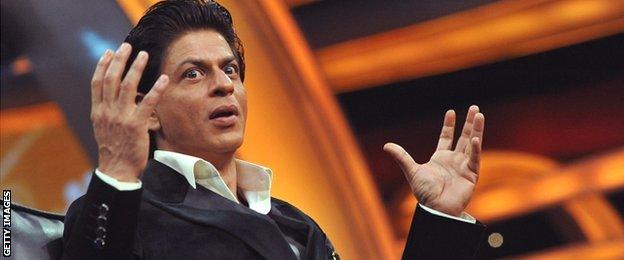
Shah Rukh Khan, known as the "King of Bollywood", is due to put in an appearance at the Indian Open
Major Bollywood stars including actor Shah Rukh Khan, external have accepted invitations to come and watch the Indian Open this week - and those running the sport here are confident snooker will be a long-running franchise rather than a short feature.
Not everything has gone to plan at this year's second staging of the event. The tournament was originally postponed from last October because of political unrest over regional elections.
There are big-name absentees in Mumbai - notably Ronnie O'Sullivan, Mark Selby, Neil Robertson and Shaun Murphy, who chose not to enter in their build-up to next month's World Championships - while Ali Carter and Marco Fu suffered visa problems and did not take their place in the draw.
But in the big picture India has some huge ready-made advantages on which to base its snooker revolution that even China did not enjoy; notably a distinguished cue-sports tradition, and a large starting base of players - with the similarly vast potential market for recruits.
For now Mehta is India's snooker standard-bearer and Advani a national billiards treasure, dabbling when it suits. But a cricket-crazy nation is starting to get serious about snooker. And the next wave should not be long in arriving.
- Published7 March 2015
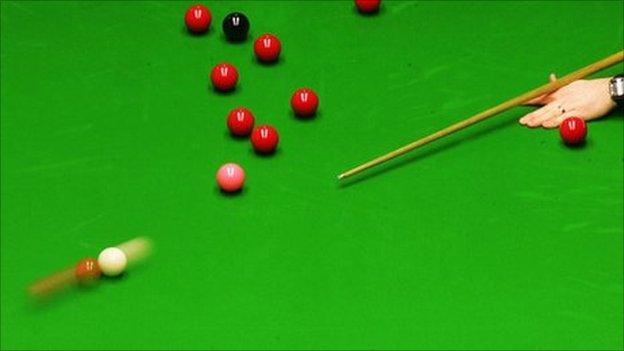
- Published3 February 2014
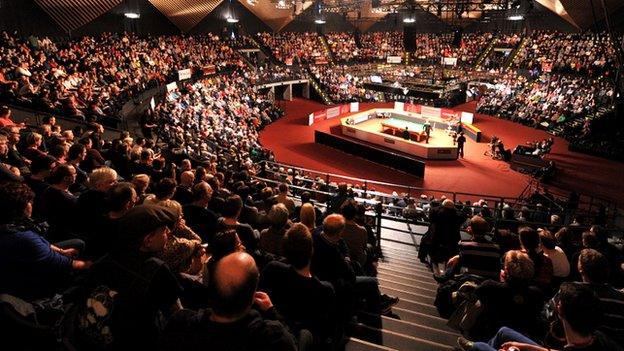
- Published31 October 2012
